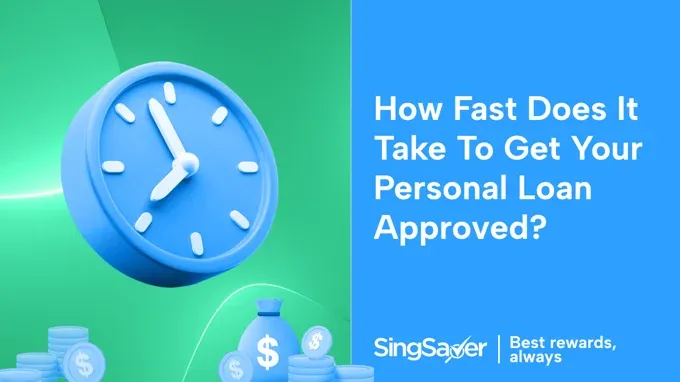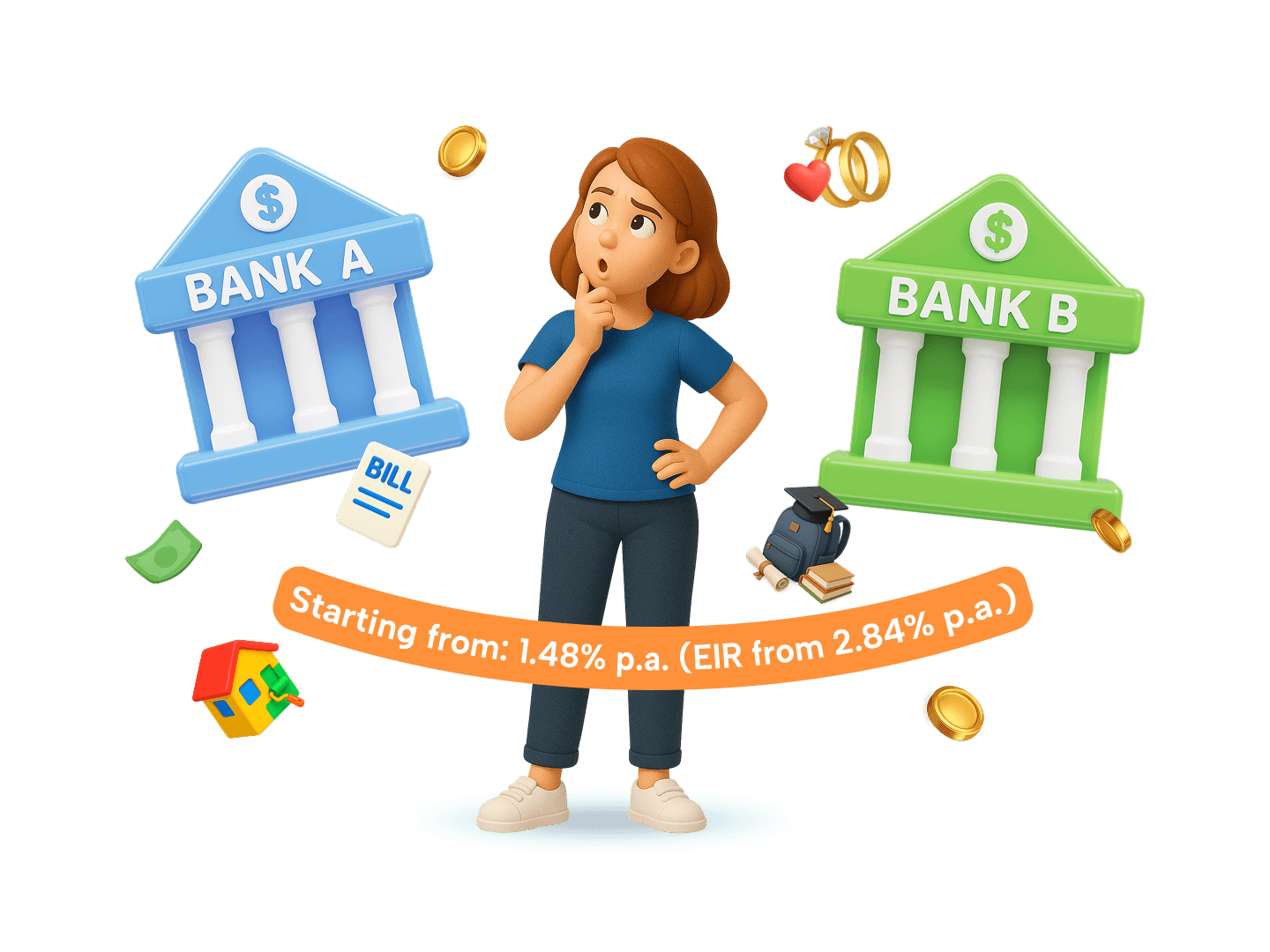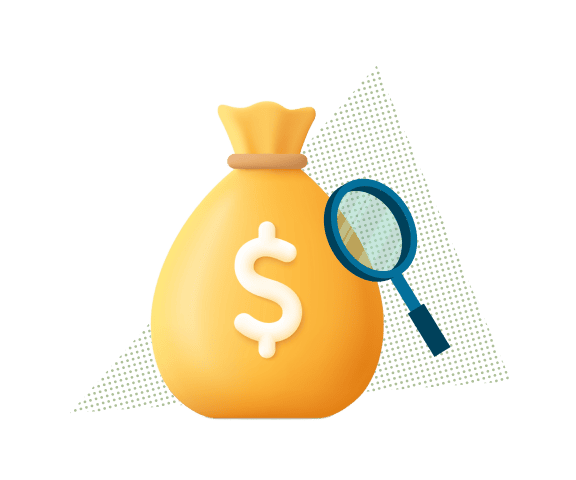How Long Does It Take to Get a Personal Loan or Bank Loan in Singapore?
Updated: 11 Apr 2025
This guide outlines the essential documents required to apply for a personal loan in Singapore, helping you prepare and increase your chances of approval.
Written bySingSaver Team
Team

The information on this page is for educational and informational purposes only and should not be considered financial or investment advice. While we review and compare financial products to help you find the best options, we do not provide personalised recommendations or investment advisory services. Always do your own research or consult a licensed financial professional before making any financial decisions.
If you're considering applying for a personal loan, you might be wondering about the timeframe involved. How long does it take to actually get the funds? Well, the good news is that personal loans are generally known for their relatively quick processing times.
The exact duration depends on the lender and specific circumstances, but many lenders in Singapore can disburse the loan amount within a week of receiving your application. Some even offer same-day or next-day approval, making it a convenient option for those who need funds urgently.
SingSaver Personal Loans Cashback Offer
Enjoy interest rates as low as 1.52% p.a. (EIR from 2.92% p.a.) and up to S$1,900 in cashback when you apply for a personal loan via SingSaver. Valid till 16 December 2025. T&Cs apply.
How long does it take to get a personal loan in Singapore?
The time it takes to get a personal loan in Singapore can vary depending on several factors, including the lender you choose and how quickly you complete the application steps. Generally, you can expect to receive your funds within a few days to two weeks.
The personal loan process typically involves three main stages:
- Application: This stage involves submitting your loan application and providing the necessary documents. It can often be done online and may take only a few minutes. Some lenders also offer pre-qualifying options for a personal loan, allowing you to check your eligibility and potential interest rates without affecting your credit score.
- Approval: Once you've submitted your application, the lender will review it and assess your creditworthiness. This may involve a hard credit check. Approval times can vary, but some lenders offer same-day or next-day approval.
- Disbursement: After your loan is approved, the lender will disburse the funds to your bank account. This can take a few business days to complete.
To speed up the process, ensure you meet the lender's eligibility criteria, provide all the required documents, and apply online if possible. You can also compare the best personal loan offers from different lenders to find the one with the best Effective Interest Rate (EIR), and the one that suits your needs and offers the fastest funding time.
Personal loan funding timeline by lender
|
Lender type |
Approval and funding time |
|
Online lenders |
1 - 3 business days |
|
Banks |
Within a week |
|
Credit unions |
Within a week |
|
Licensed money lenders |
Varies, can be as quick as same-day approval |
The time it takes to get your personal loan approved and funded can vary depending on the type of lender you choose. Here's a quick overview of the typical timelines for different lenders in Singapore:
Online lenders
If you're looking for the fastest funding, online lenders are often the best lenders for quick cash. They can typically process applications and disburse funds within 1-3 business days. This streamlined process is ideal for those who need quick access to cash.
>> More: Best fast cash loans in Singapore
Banks
Banks generally take a bit longer to process personal loans, with approval and funding times ranging from a few days up to two weeks. However, if you're an existing customer with a good banking history, you might be able to expedite the process.
Credit unions
Credit unions offer a similar timeline to banks, usually taking a few business days or longer to approve and fund a loan. They might also be more accessible to those with less-than-perfect credit, as they often consider your membership history in their assessment.
>> More: Alternatives to bank loans
Licensed moneylenders
Licensed moneylenders in Singapore can provide quicker loan approvals and disbursements compared to banks, sometimes within the same day. However, it's crucial to choose a reputable and licensed moneylender and carefully review the terms and conditions before committing to a loan.
>> More: The best lenders for quick cash
5 tips to get a personal loan quickly
Want to speed up your personal loan application and get the funds you need quickly? Here are five tips to help you expedite the process:
1. Check your creditworthiness
Before you even apply, review your credit report and ensure your credit score is in good shape. A strong credit history can significantly increase your chances of approval and may even qualify you for lower interest rates. You can obtain a copy of your credit report from Credit Bureau Singapore.
2. Compare offers and requirements
Different lenders have different eligibility criteria and processing times. Compare offers from various banks and financial institutions to find the ones that best suit your needs and offer the fastest turnaround.
3. Gather your documents in advance
Prepare all the necessary documents beforehand, such as your NRIC, proof of income and any other supporting documents required by the lender. Having everything ready can significantly speed up the application process.
4. Apply online
Many lenders now offer online applications, which are typically faster and more convenient than traditional paper-based applications. Opt for online applications whenever possible to expedite the process.
Need cash fast?
Stop wondering about loan timelines. Find the best personal loan offers with quick approvals today.
Types of loans to avoid getting
While it can be tempting to go for quick and easy loans when you're in a financial pinch, some types of loans can do more harm than good. Here are a few to be wary of:
Payday loans
These are short-term, unsecured loans with extremely high interest rates. They're typically due on your next payday, hence the name. While they can provide fast cash, the exorbitant interest charges can quickly trap you in a cycle of debt.
Pawnshop loans
These loans involve using a personal item as collateral. You receive a loan amount that's a percentage of the item's value, but you risk losing the item if you can't repay the loan plus interest and fees.
Car title loans
Similar to pawnshop loans, car title loans require you to use your car's title as collateral. These loans often come with high interest rates and the risk of losing your vehicle if you default on the loan.
Unlicensed moneylenders
Avoid borrowing from unlicensed moneylenders, as they often engage in unethical practices and charge exorbitant interest rates, resulting in bad credit loans. Always ensure the lender is licensed by the Ministry of Law in Singapore.
Read: Payday loans
Alternatives to personal loans
If you need quick cash but don't qualify for a personal loan or need the funds even faster, there are several fast-cash options you can consider:
-
Sell items you no longer need: Declutter your home and sell unwanted items online or through consignment shops. This can be a quick way to generate cash and free up space. Online platforms like Carousell and Facebook Marketplace are popular choices in Singapore.
-
Take on a side gig: Utilise your skills and free time to earn extra income through a side gig. Explore options like food delivery, freelance work or becoming a private hire driver.
-
Utilise payment plans: Many businesses, including healthcare providers and utility companies, offer interest-free payment plans that allow you to split large bills into smaller, more manageable installments.
-
Opt for "Buy Now, Pay Later" (BNPL) schemes: Buy Now, Pay Later (BNPL) services like Atome let you make purchases and pay for them in installments, often without interest charges. This can be helpful for managing larger expenses.
-
Access your paycheck in advance: Some employers offer early access to a portion of your salary, providing a short-term cash solution without the need for a loan.
-
Explore government assistance schemes: The Singapore government offers various financial assistance schemes for citizens and permanent residents facing financial difficulties. These schemes can provide grants, subsidies or loans to help cover essential expenses.
>> More: Fast cash options
Where can you get a personal loan in Singapore?
The two main sources of personal loans in Singapore are banks and financial institutions — as well as licensed moneylenders. We’ll take a look at each in turn.
Personal loans from banks and financial institutions
Banks are the most popular source of personal loans in Singapore. The benefits of taking a personal loan from a bank are that they are well-regulated, have competitive interest rates, are convenient, and can be easily managed via mobile banking apps.
You can easily search and compare the best bank loans, quickly getting a sense of the average interest rates being offered as well as how long it takes to get one approved. As personal loans are highly popular in Singapore, banks are always competing with each other, and that does help to keep interest rates low — a boon for borrowers.
Personal loans from banks are also highly convenient. You can often apply for a personal loan from your bank using your existing internet banking credentials, get your application approved very quickly, and receive the funds directly into your account. Your personal loan will be included in your monthly bank statements, so you can easily keep track of important details such as your next payment date, remaining loan instalments, etc.
Besides banks, there are also some financial institutions in Singapore that offer personal loans. They largely work in the same way, being monthly instalment loans that you pay off over a stipulated period of time.
Though uncommon, some financial institutions may be able to approve loans with similar interest rates to banks. If you manage to find one, there’s no harm in choosing to go with the cheaper loan, as financial institutions are just as well-regulated as banks.
Read: The best bank loans
How to make the personal loan process even faster?
In the previous sections, we’ve discussed some of the factors that could delay your personal loan approval. Therefore, to shorten the time it takes for lenders to approve your personal loan, here are a few additional points to note:
-
Try taking a loan against your credit card account. This will lower your credit limit, but such applications are often the quickest.
-
Use your mobile banking app and SingPass when applying for a personal loan. This will streamline the information-gathering process.
-
Ensure you meet the requirements. Any discrepancies could cause a delay and rejection of your loan.
-
Be sure to submit any and all required supporting documents. Doing so will prevent unnecessary delays.
How quickly can you get your money upon approval?
In summary, the time it takes to receive your personal loan funds can vary significantly depending on several factors. While some lenders offer quick disbursal, with funds arriving in your account within 15 minutes of approval, others may take a few business days to complete the process.
Several factors can influence the funding timeline, including the lender's internal processes, your debt-to-income ratio, and whether you've provided all the necessary documents. It's always a good idea to check with the lender directly for their estimated disbursement time.
To get your personal loan quickly, it's helpful to understand what can affect the funding timeline and take steps to prepare your application accordingly. This way, you can increase your chances of receiving the money you need as soon as possible.
About the author
SingSaver Team
At SingSaver, we make personal finance accessible with easy to understand personal finance reads, tools and money hacks that simplify all of life’s financial decisions for you.

